Reticles
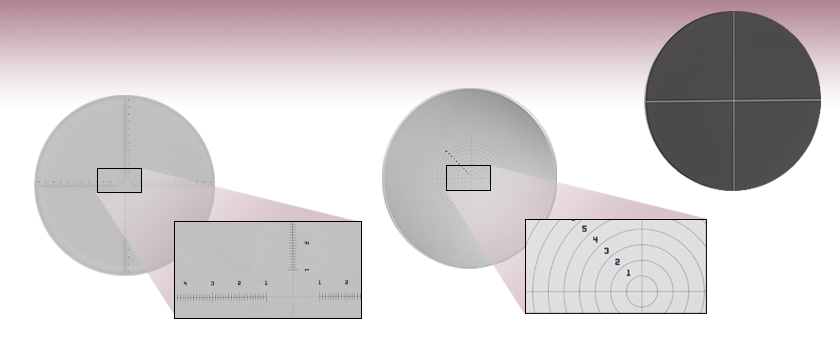
- Crosshair, Scaled Crosshair, or Concentric Circle Crosshair Pattern
- UV Fused Silica Substrate Offers High Transmission
- 19.0 mm, 21.0 mm, or 1" Diameters
R1DS2P
Positive
R1DS3N
Negative
R1DS3P2
Positive
Concentric Circles Crosshair Pattern
Scaled Crosshair Pattern

Please Wait
| Common Specifications | |
|---|---|
| Diameter Tolerance | +0.0/-0.1 mm |
| Substrate | UV Fused Silicaa |
| Substrate Thickness | 1.5 mm (0.06") |
| Transmitted Wavefront Error | <λ at 633 nm |
| Surface Quality | 60-40 Scratch-Dig |
| OD of Chrome Coating (Typ.) | ≥3.0 at 430 nm |
| Clear Aperture | >90% |
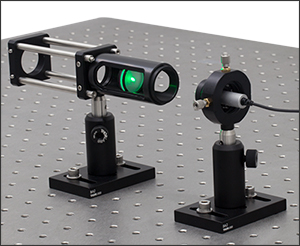
Click to Enlarge
Figure 1. An R1DS3N Negative Reticle and a DG10-1500 Diffuser shown mounted with the ground side against the reticle. Together, they create an alignment target for a CPS520 Laser Diode Module that is mounted in KAD11F Kinematic Adapter and an LM1XY Translation Mount. The light is incident on the polished side of the diffuser.
Features
- Positive and Negative Crosshair, Scaled Crosshair, and Concentric Circle Patterns
- Available Sizes: Ø19.0 mm, Ø21.0 mm, and Ø1"
- UV Fused Silica Substrate
- Patterns Made of Chrome Layer that is 0.120 µm Thick
Reticles are optics that can superimpose a pattern onto an image or spatially filter light through a pattern. The reticle pattern provides a reference location and allows an imaged object or beam to be centered or measured. Many of our reticles are available as both positive and negative patterns. Positive reticles consist of high-reflectivity, vacuum-sputtered chrome patterns plated on clear substrates and are often placed in an image plane of an imaging system to superimpose the pattern onto an image. Negative reticles use the same chrome coating to cover the substrates, leaving the patterns clear and are often used as alignment targets for beams (see Figures 1-3) and in back-lit or highly illuminated applications. When backlit, the pattern of a negative reticle can be projected onto a dark image. Please see the Specs tab for a comprehensive list of options.
Because they are intended to be used in transmission, Thorlabs' line of reticles is made from a UV fused silica substrate, unlike our test targets, which are made from soda lime glass. UV fused silica provides excellent transparency from the infrared down into the ultraviolet.
All the parts shown here are manufactured at Thorlabs Spectral Works in Columbia, South Carolina. Our extensive production capabilities enable us to provide solutions for imaging system calibration and measurements. We use contact photolithography with a mask aligner to define the pattern on the glass substrate. Once the pattern is defined, we chemically etch the substrates and clean them in a class 100 cleanroom.
Thorlabs also offers a selection of test targets, calibration targets, and stage micrometers for imaging systems.
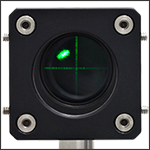
Click to Enlarge
Figure 3. View through the Reticle shown in Fig. 1 when the laser is misaligned
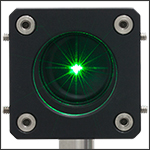
Click to Enlarge
Figure 2. View through the reticle shown in Fig. 1 when the laser is aligned
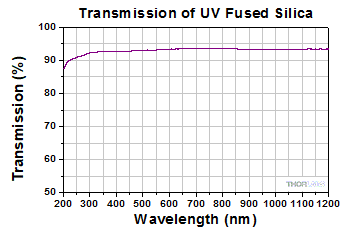
Click to Enlarge
Transmission for 1.0 mm UVFS Substrate
For a graph that extends to 3.2 µm, please see the Graphs tab.
| Common Specifications | |
|---|---|
| Diameter Tolerance | +0.0/-0.1 mm |
| Substrate | UV Fused Silicaa |
| Substrate Thickness | 1.5 mm (0.06") |
| Transmitted Wavefront Error | <λ at 633 nm |
| Surface Quality | 60-40 Scratch-Dig |
| OD of Chrome Coating (Typ.) | ≥3.0 at 430 nm |
| Clear Aperture | >90% |
| Scaled Crosshair Reticles | ||||
|---|---|---|---|---|
| Item # | Diameter | Positive/Negative | Tick Mark Spacing | Line Thickness (Typ.) |
| R1DS3P2 | 1" (25.4 mm) | Positive | Minor Ticks: 10 µm, Major Ticks: 100 µm (Up to 1 mm from Center); Minor Ticks: 100 µm, Major Ticks: 1 mm (1 mm from Center to the Edge of the Optic) |
2 µm (Up to 1 mm from Center), 10 µm (1 mm from Center to the Edge of the Optic) |
| R1DS3N2 | 1" (25.4 mm) | Negative | ||
| Concentric Circles & Crosshair Reticles | ||||||
|---|---|---|---|---|---|---|
| Item # | Diameter | Positive/Negative | # of Circles | Pitcha | Diameter of Largest Circle | Line Thickness |
| R19DS13P | 19.0 mm | Positive | 10 | 1 mm | 10 mm | 10 µm |
| R21DS7P | 21.0 mm | Positive | 10 | 1 mm | 10 mm | 10 µm |
| R1DS2P2 | 1" (25.4 mm) | Positive | 20 | 0.5 mm | 10 mm | 10 µm (Typ.) |
| R1DS2P | 1" (25.4 mm) | Positive | 10 | 1 mm | 10 mm | 10 µm |
| R1DS2P1 | 1" (25.4 mm) | Positive | 4 | 5 mm | 20 mm | 250 µm (Typ.) |
| R1DS2N2 | 1" (25.4 mm) | Negative | 20 | 0.5 mm | 10 mm | 10 µm (Typ.) |
| R1DS2N | 1" (25.4 mm) | Negative | 10 | 1 mm | 10 mm | 10 µm |
| R1DS2N1 | 1" (25.4 mm) | Negative | 4 | 5 mm | 20 mm | 250 µm (Typ.) |
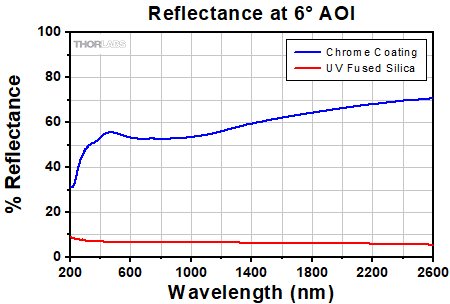
Click to Enlarge
Reflectance of Chrome Coating and UV Fused Silica
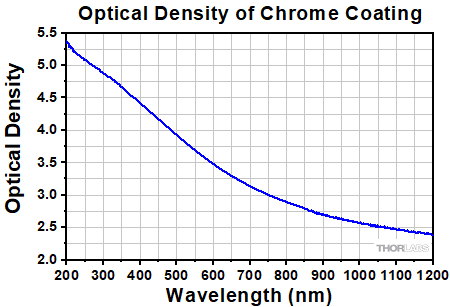
Click to Enlarge
Optical Density of Chrome Coating on a UV Fused Silica Substrate
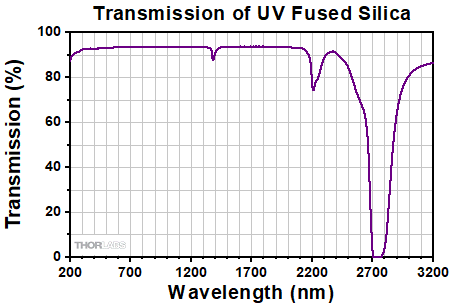
Click to Enlarge
The transmission plot was measured at normal incidence using a UV fused silica substrate that was 1.0 mm thick. The transmission for the reticles sold here will be slightly lower because of their 1.5 mm thickness.
| Customization Parameters | ||
|---|---|---|
| Substrate Sizea | Min | 8 mm x 8 mm (5/16" x 5/16") |
| Max | 85 mm x 85 mm (3.35" x 3.35") | |
| Substrate Materials | Soda Lime Glass UV Fused Silica Quartz |
|
| Coating Material | Chromeb Low-Reflectivity Chromec |
|
| Coating Optical Density | ≥3d or ≥6e @ 430 nm | |
| Minimum Pinhole/Spot | Ø1 µm | |
| Minimum Line Width | 1 µm | |
| Line Width Tolerance | -0.25 / +0.50 µm | |
| Maximum Line Density | 500 lp/mm | |
Custom OEM Test Targets and Reticles
Our in-house photolithographic design and production capabilities enable us to create a range of patterned optics. We manufacture test targets, distortion grids, and reticles at our Thorlabs Spectral Works facility in Columbia, South Carolina. These components have served a wide variety of applications, being implemented in microscopes, imaging systems, and optical alignment setups.
In addition to our catalog test targets and reticles offered from stock, we can provide custom chrome patterns on soda lime, UV fused silica, or quartz substrates from 8 mm by 8 mm up to 85 mm by 85 mm. Substrates can be cut to shape for your application. Our photolithographic coating process allows us to create chrome features down to 1 µm. A few sample patterns are shown below, which can be made positive or negative, as shown in the image directly below.
For a quote on custom test targets and reticles, please contact us at TSW@thorlabs.com.
Sample Patterns
Example Applications
- Etched Reticles
- Gray Scale Masks
- Resolution Reticles
- Diagnostic Reticles
- Recreational Scopes
- Notching Reticles
- Eyepiece Scales
- Illuminated Crosshairs
- Obstruction Targets
- Binocular Reticles
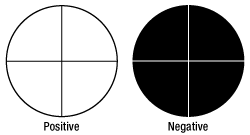
Click to Enlarge
Positive and Negative Crosshair Sample Pattern
This tab details an optimal cleaning technique developed by our engineers for cleaning reticles, test targets, distortion targets, and calibration targets.
Cleaning Procedure
- Use a clean wet sponge, preferably made of polyvinyl alcohol (PVA), and dish detergent to gently scrub the front and back surfaces of your reticle or target.
- Rinse with water.
- Blow dry with clean dry air, or allow the reticle or target to air dry on a clean surface.
We do not suggest using a towel, rag, or wipe to dry the surface. If contamination persists, soak the reticle or target in a detergent and water solution for 1 hour, repeating as necessary.
| Posted Comments: | |
user
(posted 2024-07-23 15:45:06.79) Can you please add a graph of the reflectivity of the chrome coating out to 12µm+? I'm fairly sure your spectrophotometer in optics can do this, so it should be a straightforward task. Thanks! cdolbashian
(posted 2024-07-29 11:36:23.0) Thank you for this suggestion. Upon your suggestion, we are working on gathering such additional information for the web presentation. Austin Linder
(posted 2024-06-07 08:29:12.513) Hello, it would be nice if there was a ground glass option for this reticle. Thanks! cdolbashian
(posted 2024-06-28 11:01:14.0) Thank you for reaching out to us with this inquiry. I have reached out to you directly in order to discuss the possibility of a custom. 誠一 阿部
(posted 2023-02-17 20:02:25.997) お世話になります。
R1DS2P、R1DS2Nは、1mmピッチだと思いますが、0.5mmピッチもございますでしょうか? cdolbashian
(posted 2023-04-03 09:37:27.0) Translation: Thank you very much for your help. I think R1DS2P and R1DS2N have 1mm pitch, but do you also have 0.5mm pitch?
Thank you for your request! Indeed this is something we can do as a custom. I have put you in contact with your local tech support team, and our custom team in order to facilitate this for you. Mark Wilder
(posted 2021-06-25 13:58:05.987) I've used this reticle extensively in a number of setups, with alignment telescopes and theodolites. I find the crosshair to actually be a bit too narrow to be able to readily see. It would be great if you could make a 20 and/or a 40 micron version. YLohia
(posted 2021-06-28 10:18:34.0) Thank you for your feedback. We will consider offering a thicker crosshair in the future. Carla Coltharp
(posted 2021-02-23 11:50:37.81) Hi,
What is the tolerance for the centration of the pattern relative to the part's outer diameter?
Thanks! YLohia
(posted 2021-02-24 10:08:45.0) Hello, we do not have a strict tolerance for the centration of the R1D2SN, but we expect it to be off by up to +/-0.25 mm in the worst case scenario. Daniel Schlenk
(posted 2020-07-17 07:59:34.737) Dear Sir or Madame,
can you also provide customized reticles?
Our design would be very simple: A filled circle in the center of a round substrate. Please finde more details below.
Thank you for your efforts.
Best regards,
Daniel Schlenk
Color: Black / Dark (visible wavelength range)
Reticle Diameter: 46mm (42mm to 48mm possible)
Reticle Thickness: about 3.0mm (other thickness possible)
8Design: one filled circle in the center, 6mm diameter. What is the accuracy in the position of the circle? (required: a few µm) YLohia
(posted 2020-07-17 10:36:00.0) Hello Daniel, thank you for contacting Thorlabs. Custom reticles can be requested by emailing your local Thorlabs Tech Support team (in your case, europe@thorlabs.com). We will reach out to you directly to discuss this further. user
(posted 2019-10-02 04:53:29.167) what is the thickness tolerance of the 1,5mm thick substrate? YLohia
(posted 2019-10-02 09:52:38.0) Hello, thank you for contacting Thorlabs. The tolerance on the thickness of the R19DS11P is 1.4986 mm +0.000/-0.2032 mm. The diameter tolerance is +0.0/-0.1 mm. jijin
(posted 2019-01-31 20:49:47.887) * Is it possible to get a customized Positive Concentric Circle Reticle YLohia
(posted 2019-01-31 09:32:42.0) Hello, thank you for contacting Thorlabs. Custom reticles can be requested by emailing techsupport@thorlabs.com with your exact requirements and order quantity. We will reach out to you directly to discuss this further. user
(posted 2017-03-16 17:49:03.593) Negative Crosshair Reticle, 19mm, UVFS and both positive and negative reticles at 0.5" diameter would be very useful/helpful. Thanks! tfrisch
(posted 2017-03-23 09:55:03.0) Hello, thank you for contacting Thorlabs. If you are interested in a custom version, please reach out to us at TechSupport@Thorlabs.com, we may be able to offer something suitable for your application. schneider
(posted 2014-12-09 10:22:11.213) Hello. I am using the R19DS13P for alignment. Looking at the reticle under a simple microscope and assuming the cicles to be 1mm apart (500µm line separation) the line width seems to be less than 25 µm (10-15µm). Is this correct? From the description:"The pattern is formed from lines that are 25 µm wide." myanakas
(posted 2015-01-14 02:15:59.0) Response from Mike at Thorlabs: Thank you for your feedback. The linewidth of the concentric circles should be 10 um, while the linewidth of the crosshairs should be 25 um. We are currently working to get this updated on the website. michael.wegner
(posted 2013-11-14 12:49:17.18) Dear Sirs
For a high precision alignment telescope built
almost solely of Thorlabs components :-) I use
your reticles R1DS3N and R1DS3P.
Now there is my question: Can you please tell me
how precise the shape of the circles is deviating from the ideal circular shape? This question I should answer to my project steering comitee here.
Thanks in advance and best Regards
Michael Wegner
Senior Engineer
Metrology Department
Swissoptic AG
Heerbrugg, Switzerland
P.S. Please answer by E-Mail:
michael.wegner@swissoptic.com jlow
(posted 2013-12-11 08:49:51.0) Response from Jeremy at Thorlabs: The centration tolerance is ±125µm. The outer diameter tolerance is +0.0/-0.2mm. I will contact you via e-mail to discuss about this. user
(posted 2013-07-07 21:04:15.717) The custom reticles tab shows some useful reticles. Why don't you sell those too? tcohen
(posted 2013-07-11 16:24:00.0) Response from Tim at Thorlabs: Thank you for contacting us! The custom reticles tab was made to describe our capabilities for customs. There is a large tooling cost for releasing a new reticle and so we chose the most popular versions for initial release. We also have more test targets at http://www.thorlabs.com/newgrouppage9.cfm?objectgroup_id=4338. We appreciate feedback on designs that would be most useful for you as we continue to release new products. I see that you didn’t leave any contact information but we would be interested in your feedback. To discuss this further please contact us at techsupport@thorlabs.com. |

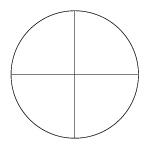
Click for Details
Crosshair Pattern
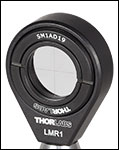
Click to Enlarge
R19DS11P in SM1AD19 Mounting Adapter
- Crosshair Extends to the Edge of the Optic
- Positive Crosshairs Available in 19.0 mm, 21.0 mm, and 1" (25.4 mm) Diameters
- Negative Crosshairs Available in 1" (25.4 mm) Diameter
- 10 µm or 25 µm Thick Lines
Our crosshair (crossline) reticles are used to superimpose a reference pattern on an object being imaged. The crosshairs span the entire diameter of the optic with lines that are 25 µm or 10 µm (Ø1" optic only) thick. Made by plating chrome onto one side of a 1.5 mm thick UV fused silica substrate, these optics provide greater than 90% transmission in the 200 - 1200 nm spectral range.
The Ø19.0 mm reticle can be adapted to Ø1" mounts by inserting it into an AD19T or SM1AD19 Mounting Adapter. The AD19T adapter has a smooth outer perimeter, making it compatible with any standard Ø1" mount, while the SM1AD19 adapter has external SM1 (1.035"-40) threading, providing the ideal match for Thorlabs' line of SM1-threaded optomechanics.

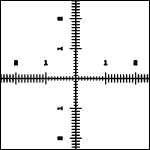
Click for Details
Detail of the Scaled Crosshair Pattern
- Graduated Crosshair Extends to the Edge of the Optic
- Tick Mark Spacings:
- 10 µm up to 1 mm from Center
- 100 µm and 1 mm up to 12 mm from Center
- Positive and Negative Crosshairs Available in 1" (25.4 mm) Diameter
Our scaled crosshair (crossline) reticles are used to superimpose a graduated reference pattern on an object being imaged. The crosshairs span the entire diameter of the optic with a graduated scale of tick marks that go up to 12 mm from center. The first set of tick marks are 2 µm thick and are spaced every 10 µm up to 1 mm from the center (the crosshair is also 2 µm thick within this radius). The next set of tick marks are 10 µm thick and spaced every 100 µm, extending from 1 mm to 12 mm from the center (the crosshair is also 10 µm thick from 1 mm from the center to the edge of the optic). Made by plating chrome onto one side of a 1.5 mm thick UV fused silica substrate, these optics provide greater than 90% transmission in the 200 - 1200 nm spectral range.
The Ø19.0 mm reticle can be adapted to Ø1" mounts by inserting it into an AD19T or SM1AD19 Mounting Adapter. The AD19T adapter has a smooth outer perimeter, making it compatible with any standard Ø1" mount, while the SM1AD19 adapter has external SM1 (1.035"-40) threading, providing the ideal match for Thorlabs' line of SM1-threaded optomechanics.

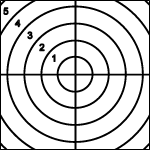
Click for Details
Detail of the Numbered Concentric Circles Pattern (Item # R19DS13P)
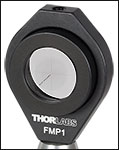
Click to Enlarge
R19DS13P in AD19T Mounting Adapter
- Concentric Circles Superimposed on a Crosshair
- Circle Diameter Spacing of 0.5 mm, 1 mm, or 5 mm
- Positive Pattern Available in 19.0 mm, 21.0 mm, and 1" (25.4 mm) Diameters
- Negative Pattern Available in 1" (25.4 mm) Diameter
Our concentric circles reticles consist of a centered crosshair and concentric circles increasing in diameter by 0.5 mm, 1 mm, or 5 mm. The diameters are labeled in 1 mm increments (0.5 mm and 1 mm pitch circles) or 5 mm increments (5 mm pitch circles). The pattern is formed from lines that are 10 µm wide (0.5 mm and 1 mm pitch circles) or 250 µm wide (5 mm pitch circles). Made by plating chrome onto one side of a 1.5 mm thick UV fused silica substrate, these optics provide greater than 90% transmission in the 200 - 1200 nm spectral range.
The Ø19.0 mm reticle can be adapted to Ø1" mounts by inserting it into an AD19T or SM1AD19 Mounting Adapter. The AD19T adapter has a smooth outer perimeter, making it compatible with any standard Ø1" mount, while the SM1AD19 adapter has external SM1 (1.035"-40) threading, providing the ideal match for Thorlabs' line of SM1-threaded optomechanics.
 Products Home
Products Home













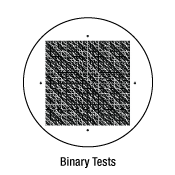 Click to Enlarge
Click to Enlarge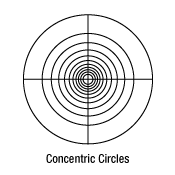 Click to Enlarge
Click to Enlarge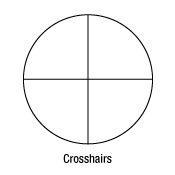 Click to Enlarge
Click to Enlarge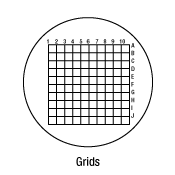 Click to Enlarge
Click to Enlarge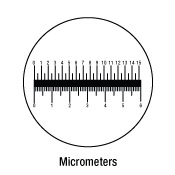 Click to Enlarge
Click to Enlarge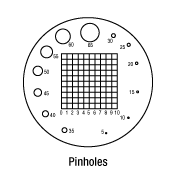 Click to Enlarge
Click to Enlarge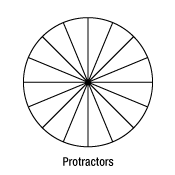 Click to Enlarge
Click to Enlarge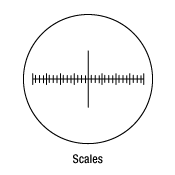 Click to Enlarge
Click to Enlarge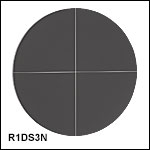
 Zoom
Zoom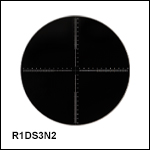
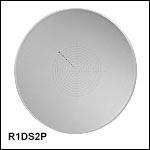
 Reticles
Reticles